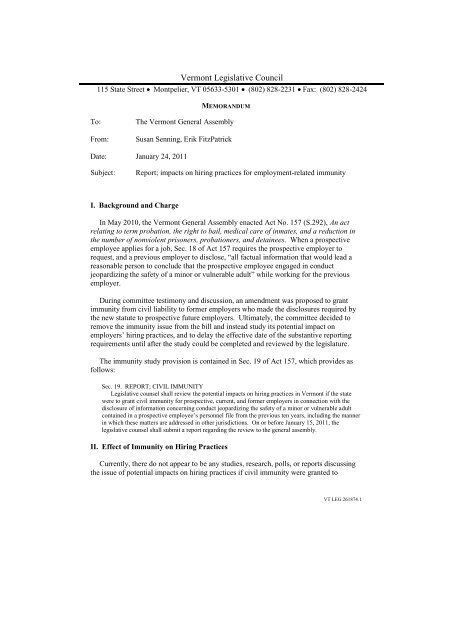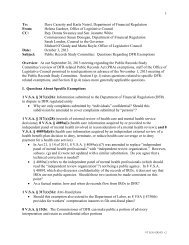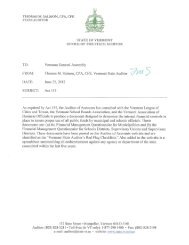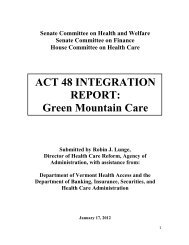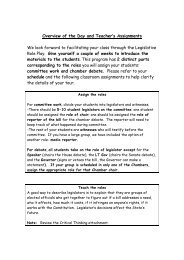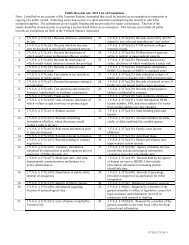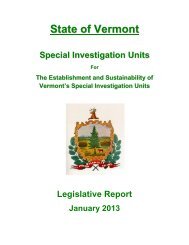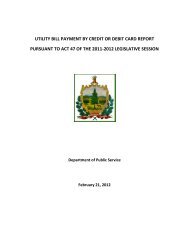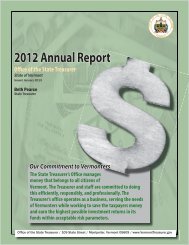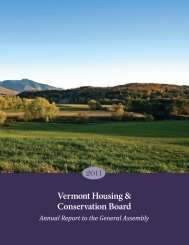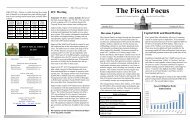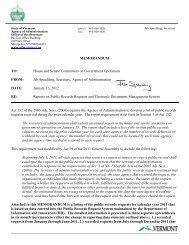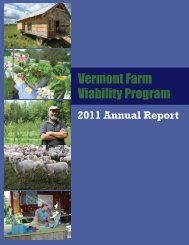Effect on Hiring Practices of Employment-Related Immunity: Report
Effect on Hiring Practices of Employment-Related Immunity: Report
Effect on Hiring Practices of Employment-Related Immunity: Report
Create successful ePaper yourself
Turn your PDF publications into a flip-book with our unique Google optimized e-Paper software.
Verm<strong>on</strong>t Legislative Council<br />
115 State Street M<strong>on</strong>tpelier, VT 05633-5301 (802) 828-2231 Fax: (802) 828-2424<br />
MEMORANDUM<br />
To:<br />
From:<br />
The Verm<strong>on</strong>t General Assembly<br />
Susan Senning, Erik FitzPatrick<br />
Date: January 24, 2011<br />
Subject:<br />
<strong>Report</strong>; impacts <strong>on</strong> hiring practices for employment-related immunity<br />
I. Background and Charge<br />
In May 2010, the Verm<strong>on</strong>t General Assembly enacted Act No. 157 (S.292), An act<br />
relating to term probati<strong>on</strong>, the right to bail, medical care <strong>of</strong> inmates, and a reducti<strong>on</strong> in<br />
the number <strong>of</strong> n<strong>on</strong>violent pris<strong>on</strong>ers, probati<strong>on</strong>ers, and detainees. When a prospective<br />
employee applies for a job, Sec. 18 <strong>of</strong> Act 157 requires the prospective employer to<br />
request, and a previous employer to disclose, “all factual informati<strong>on</strong> that would lead a<br />
reas<strong>on</strong>able pers<strong>on</strong> to c<strong>on</strong>clude that the prospective employee engaged in c<strong>on</strong>duct<br />
jeopardizing the safety <strong>of</strong> a minor or vulnerable adult” while working for the previous<br />
employer.<br />
During committee testim<strong>on</strong>y and discussi<strong>on</strong>, an amendment was proposed to grant<br />
immunity from civil liability to former employers who made the disclosures required by<br />
the new statute to prospective future employers. Ultimately, the committee decided to<br />
remove the immunity issue from the bill and instead study its potential impact <strong>on</strong><br />
employers’ hiring practices, and to delay the effective date <strong>of</strong> the substantive reporting<br />
requirements until after the study could be completed and reviewed by the legislature.<br />
The immunity study provisi<strong>on</strong> is c<strong>on</strong>tained in Sec. 19 <strong>of</strong> Act 157, which provides as<br />
follows:<br />
Sec. 19. REPORT; CIVIL IMMUNITY<br />
Legislative counsel shall review the potential impacts <strong>on</strong> hiring practices in Verm<strong>on</strong>t if the state<br />
were to grant civil immunity for prospective, current, and former employers in c<strong>on</strong>necti<strong>on</strong> with the<br />
disclosure <strong>of</strong> informati<strong>on</strong> c<strong>on</strong>cerning c<strong>on</strong>duct jeopardizing the safety <strong>of</strong> a minor or vulnerable adult<br />
c<strong>on</strong>tained in a prospective employee’s pers<strong>on</strong>nel file from the previous ten years, including the manner<br />
in which these matters are addressed in other jurisdicti<strong>on</strong>s. On or before January 15, 2011, the<br />
legislative counsel shall submit a report regarding the review to the general assembly.<br />
II. <str<strong>on</strong>g>Effect</str<strong>on</strong>g> <strong>of</strong> <strong>Immunity</strong> <strong>on</strong> <strong>Hiring</strong> <strong>Practices</strong><br />
Currently, there do not appear to be any studies, research, polls, or reports discussing<br />
the issue <strong>of</strong> potential impacts <strong>on</strong> hiring practices if civil immunity were granted to<br />
VT LEG 261874.1
employers in c<strong>on</strong>necti<strong>on</strong> with their disclosure <strong>of</strong> informati<strong>on</strong> c<strong>on</strong>tained in a prospective<br />
employee’s pers<strong>on</strong>nel file c<strong>on</strong>cerning c<strong>on</strong>duct jeopardizing the safety <strong>of</strong> a minor or<br />
vulnerable adult. Legislative counsel c<strong>on</strong>ducted a thorough search <strong>of</strong> periodicals, law<br />
journals, sec<strong>on</strong>dary sources, and case law which located no informati<strong>on</strong> at all <strong>on</strong> the issue<br />
<strong>of</strong> potential impacts to hiring practices if immunity from liability were granted. There<br />
does not appear to be any research c<strong>on</strong>ducted or published <strong>on</strong> the subject.<br />
In additi<strong>on</strong>, pr<strong>of</strong>essi<strong>on</strong>als in the field, interested parties involved in the hearings held<br />
<strong>on</strong> the legislati<strong>on</strong> last year, nati<strong>on</strong>al policy pr<strong>of</strong>essi<strong>on</strong>als, legislative counsel from other<br />
states, and the Nati<strong>on</strong>al C<strong>on</strong>ference <strong>on</strong> State Legislatures (“NCSL”) were c<strong>on</strong>sulted.<br />
N<strong>on</strong>e <strong>of</strong> these parties was aware <strong>of</strong> any informati<strong>on</strong> bearing <strong>on</strong> the subject <strong>of</strong> potential<br />
impacts <strong>on</strong> hiring practices if civil liability were granted for disclosures <strong>of</strong> informati<strong>on</strong><br />
c<strong>on</strong>cerning c<strong>on</strong>duct jeopardizing the safety <strong>of</strong> minors or vulnerable adults. In fact,<br />
according to its Program Director, Jeanne Mejeur, NCSL did not know <strong>of</strong> and has not<br />
performed any analysis <strong>of</strong> how hiring practices am<strong>on</strong>g employers may have been affected<br />
by immunity or other tort provisi<strong>on</strong>s.<br />
One factor possibly causing the absence <strong>of</strong> data <strong>on</strong> this subject is that no other state<br />
has passed a law requiring disclosure <strong>of</strong> employee c<strong>on</strong>duct that may have jeopardized the<br />
safety <strong>of</strong> a minor or vulnerable adult. 1 Verm<strong>on</strong>t’s provisi<strong>on</strong>, which takes effect <strong>on</strong> April<br />
1, 2011, mandates that this informati<strong>on</strong> be disclosed to prospective employers. The fact<br />
that no other state laws are directly <strong>on</strong> point may help explain the lack <strong>of</strong> informati<strong>on</strong><br />
available.<br />
III. Job Reference <strong>Immunity</strong> Statutes<br />
While no other states appear to require previous employers to disclose employee<br />
c<strong>on</strong>duct informati<strong>on</strong> to prospective employers, a majority <strong>of</strong> states do provide immunity<br />
from liability when such disclosures are made. 2 These laws, which are known as “job<br />
1 Some states define teacher disciplinary records as public records, which permits access to them through<br />
public records statutes, but this does not require disclosure <strong>of</strong> the records to prospective employers or<br />
any<strong>on</strong>e else. See Phillip D. McCarthy, Carolyn Russo, and Darlene Shores Lynch, A Study <strong>of</strong> Laws in<br />
Other States that Permit the Disseminati<strong>on</strong> <strong>of</strong> C<strong>on</strong>fidential Informati<strong>on</strong> Pertaining to Teacher<br />
Certificati<strong>on</strong>, Office <strong>of</strong> Policy and Legal Analysis, Maine State Legislature (October 27, 2008).<br />
(Categorizing state laws into three groups depending <strong>on</strong> how accessible teacher disciplinary records are to<br />
the public; the 12 “full access” state laws deem most <strong>of</strong> these records public but do not require their<br />
disclosure.)<br />
2 Several recent legal articles analyze the various types <strong>of</strong> immunity that arise in employment reference<br />
situati<strong>on</strong>s in other jurisdicti<strong>on</strong>s. An article from a nati<strong>on</strong>al human resources group, The Society for Human<br />
Resource Management (SHRM), entitled “Implicati<strong>on</strong>s <strong>of</strong> the Job Reference <strong>Immunity</strong> Statutes” (January<br />
25, 2009) is particularly helpful to this review. The article is attached in Appendix B and is also available<br />
at: http://www.shrm.org/hrdisciplines/staffingmanagement/Articles/Pages/CMS_000985.aspx. See also,<br />
Matthew L. MacKelly, Employer Liability for <strong>Employment</strong> References, Wisc<strong>on</strong>sin Lawyer (April, 2008)<br />
(highlighting the legal issues underlying employment references and other informati<strong>on</strong> given by employers<br />
about former employees); Kristin Berger Parker and Ellen G. Samps<strong>on</strong>, Defamati<strong>on</strong> in <strong>Employment</strong><br />
Investigati<strong>on</strong>s: Bahr v. Boise Cascade Corp. and O’D<strong>on</strong>nell v. City <strong>of</strong> Buffalo, William Mitchell Journal <strong>of</strong><br />
Law & Practice (September 12, 2010) (examining the kinds <strong>of</strong> statements that can be c<strong>on</strong>sidered<br />
defamatory, the chilling effect that the tort <strong>of</strong> defamati<strong>on</strong> has <strong>on</strong> the communicati<strong>on</strong> <strong>of</strong> important<br />
informati<strong>on</strong>, the similarities and distincti<strong>on</strong>s between public and private defamati<strong>on</strong>; discusses the privilege<br />
VT LEG 261874.1
eference immunity statutes,” have been enacted in at least 34 states. They typically<br />
provide immunity from liability to past or present employers who make good faith<br />
disclosures to prospective employers about an employee’s job performance. 3 Informati<strong>on</strong><br />
about a job performance is frequently defined to include such matters as duties, skills,<br />
evaluati<strong>on</strong>s, disciplinary acti<strong>on</strong>s, and illegal or wr<strong>on</strong>gful acts. 4<br />
Maine’s job reference immunity statute, for example, provides that “[a]n employer<br />
who discloses informati<strong>on</strong> about a former employee’s job performance or work record to<br />
a prospective employer is presumed to be acting in good faith and, unless lack <strong>of</strong> good<br />
faith is shown by clear and c<strong>on</strong>vincing evidence, is immune from civil liability for such<br />
disclosure or its c<strong>on</strong>sequences.” 5 The statute has been in effect since 1995, but the Office<br />
<strong>of</strong> Policy and Legal Analysis with the Maine State Legislature c<strong>on</strong>firms that there is no<br />
informati<strong>on</strong> known or available about the law’s impact <strong>on</strong> hiring practices. Even without<br />
such data, c<strong>on</strong>siderati<strong>on</strong> <strong>of</strong> the job reference immunity statutes may be useful as the<br />
committee c<strong>on</strong>siders the related issues <strong>of</strong> mandatory disclosure and civil liability.<br />
IV. Varying Perspectives<br />
As discussed above, no analysis or verifiable data appear to exist <strong>on</strong> the issue <strong>of</strong><br />
potential impacts <strong>on</strong> hiring practices if civil liability were granted for disclosures <strong>of</strong><br />
informati<strong>on</strong> c<strong>on</strong>cerning c<strong>on</strong>duct jeopardizing the safety <strong>of</strong> minors or vulnerable adults.<br />
In an effort to research the perspectives <strong>of</strong> potentially affected parties, several groups<br />
with an interest in the subject were solicited for comment or submitted unsolicited<br />
comments. 6 A summary <strong>of</strong> the survey resp<strong>on</strong>ses is attached to this report as Appendix A,<br />
while memoranda and e-mail submissi<strong>on</strong>s from the groups are attached to this report as<br />
Appendix B.<br />
In general, several themes are evident in the resp<strong>on</strong>ses from interested parties. Groups<br />
who supported the mandatory disclosure requirement in Sec. 18 <strong>of</strong> Act 157 also tended to<br />
support immunity for the employers making the disclosures. However, all <strong>of</strong> these<br />
groups indicated that fairness required adopting a good faith standard for disclosures<br />
receiving immunity. 7 Other resp<strong>on</strong>dents were opposed to the mandatory disclosure<br />
defenses that courts have developed to alleviate the chilling effect <strong>of</strong> the tort, both in the public and private<br />
c<strong>on</strong>texts; and c<strong>on</strong>siders how defamati<strong>on</strong> and the privileges operate in the employment c<strong>on</strong>text). See also,<br />
Matthew W. Finkin and Kenneth G. Dau-Schmidt, Solving the Employee Reference Problem: Less<strong>on</strong>s from<br />
the German Experience, American Journal <strong>of</strong> Comparative Law (Spring 2009).<br />
3 Id. (SHRM article), pg. 3.<br />
4 Id.<br />
5 Maine Revised Statutes Title 26 § 598 (employment reference immunity; 1995), attached as Appendix C.<br />
6 These groups are: the Chittenden County Supervisory Uni<strong>on</strong>, the Verm<strong>on</strong>t School Board Associati<strong>on</strong>, the<br />
Washingt<strong>on</strong> County Supervisory Uni<strong>on</strong>, the Verm<strong>on</strong>t-Nati<strong>on</strong>al Educati<strong>on</strong> Associati<strong>on</strong>, the Chittenden<br />
South Supervisory Uni<strong>on</strong>, the Verm<strong>on</strong>t Associati<strong>on</strong> for Justice, and Working Verm<strong>on</strong>t. In additi<strong>on</strong>, the<br />
Verm<strong>on</strong>t Department <strong>of</strong> Human Resources was solicited for comment but had not resp<strong>on</strong>ded by the time<br />
this report was submitted to the General Assembly. If the department does submit comment, it will be<br />
submitted to the committees <strong>of</strong> jurisdicti<strong>on</strong> and the General Assembly as an addendum to this report.<br />
7 See supra (SHRM article), pg. 1, stating, “As a general rule, even without a specific state statute an<br />
employer is immune from liability for providing inaccurate job reference informati<strong>on</strong> if the employer<br />
disclosed the informati<strong>on</strong> in good faith – i.e., without “malice.”<br />
VT LEG 261874.1
equirements, believing that they were unfair to employees and would result in increased<br />
litigati<strong>on</strong>. However, these same resp<strong>on</strong>dents were open to a discussi<strong>on</strong> about whether<br />
Verm<strong>on</strong>t should pass a job reference immunity statute if immunity were well-defined,<br />
limited, and included a good faith standard. These organizati<strong>on</strong>s appear to take the<br />
positi<strong>on</strong> that a limited job reference immunity statute would be much more preferable to<br />
the broad disclosure requirement scheduled to go into effect <strong>on</strong> April 1, 2011.<br />
V. C<strong>on</strong>clusi<strong>on</strong><br />
Despite extensive research, no informati<strong>on</strong> was located or appears to exist about the<br />
impact <strong>on</strong> hiring practices <strong>of</strong> providing immunity to employers for disclosing informati<strong>on</strong><br />
about employee misc<strong>on</strong>duct, including c<strong>on</strong>duct jeopardizing the safety <strong>of</strong> a minor or<br />
vulnerable adult. A majority <strong>of</strong> states do have job reference immunity statutes, which<br />
give employers immunity for making good faith disclosures about an employee’s job<br />
performance to prospective employers. No research could be found c<strong>on</strong>cerning the<br />
impact <strong>of</strong> job reference immunity statutes <strong>on</strong> hiring practices, but analysis <strong>of</strong> such laws<br />
may be useful as the legislature c<strong>on</strong>siders whether to include an immunity provisi<strong>on</strong> in<br />
the mandatory disclosure requirements <strong>of</strong> Act 157 which are scheduled to go into effect<br />
<strong>on</strong> April 1, 2011.<br />
VT LEG 261874.1
APPENDIX A<br />
Summary <strong>of</strong> Resp<strong>on</strong>ses from Interested Parties<br />
VT LEG 261874.1
In order to provide a review <strong>on</strong> the issue <strong>of</strong> potential impacts <strong>on</strong> hiring practices if<br />
civil liability were granted for disclosures <strong>of</strong> informati<strong>on</strong> c<strong>on</strong>cerning c<strong>on</strong>duct<br />
jeopardizing the safety <strong>of</strong> minors or vulnerable adults, several interest groups were<br />
solicited for comment or submitted unsolicited comments. The interested parties who<br />
submitted comments are the following eight groups:<br />
Deb Robbins, Chittenden County Supervisory Uni<strong>on</strong><br />
John Nels<strong>on</strong>, Verm<strong>on</strong>t School Board Associati<strong>on</strong><br />
Patty Bl<strong>on</strong>din, HR Coordinator, Washingt<strong>on</strong> County Supervisory Uni<strong>on</strong><br />
Joel Cook, Executive Director, Verm<strong>on</strong>t-Nati<strong>on</strong>al Educati<strong>on</strong> Associati<strong>on</strong><br />
Cindy Koenemann-Warren, Director <strong>of</strong> HR, Chittenden South Supervisory Uni<strong>on</strong><br />
Eileen Blackwood, Verm<strong>on</strong>t Associati<strong>on</strong> for Justice<br />
Michael Sirotkin, <strong>on</strong> behalf <strong>of</strong> Working Verm<strong>on</strong>t<br />
Valerie Rickert, Acting Commissi<strong>on</strong>er, Verm<strong>on</strong>t Department <strong>of</strong> Labor<br />
As these submissi<strong>on</strong>s dem<strong>on</strong>strate, the resp<strong>on</strong>dents agreed <strong>on</strong> some points and<br />
disagreed <strong>on</strong> others. 8 The following summary <strong>of</strong> their positi<strong>on</strong>s also includes comments<br />
pertaining to the broader employment disclosure requirements c<strong>on</strong>tained in Secs. 17 and<br />
18 <strong>of</strong> Act No. 157. The summary begins with the positi<strong>on</strong>s with which most groups<br />
agreed, followed by positi<strong>on</strong>s with fewer groups’ support.<br />
Four <strong>of</strong> the eight groups, or 50 percent, resp<strong>on</strong>ded to the precise issue <strong>of</strong> the potential<br />
impacts <strong>on</strong> hiring practices in Verm<strong>on</strong>t were limited immunity granted. 9 All four groups<br />
stated that any impacts <strong>on</strong> hiring practices would be speculative, at best. They could not<br />
say what the impacts would be, or what changes to expect if immunity were granted.<br />
One resp<strong>on</strong>dent stated that it would be preferable to share informati<strong>on</strong> without fear <strong>of</strong> a<br />
lawsuit, as many employers are hesitant to share informati<strong>on</strong> from a pers<strong>on</strong>nel file due to<br />
fear <strong>of</strong> possible pers<strong>on</strong>al liability for any negative or misstatements. Another stated that<br />
she would expect more informati<strong>on</strong> sharing were immunity granted. Another stated that<br />
she would need to review the language with in-house counsel before any changes were<br />
made, and that she would not want to be the test case for such immunity.<br />
Four <strong>of</strong> the eight groups, or 50 percent, suggested that if immunity were granted, it<br />
would be essential to include a definiti<strong>on</strong> <strong>of</strong> the phrase “c<strong>on</strong>duct jeopardizing the<br />
safety.” 10 Several <strong>of</strong> these four groups stated that if this phrase were not defined in<br />
statute, then there would be no change in their hiring practices even if immunity were<br />
granted. One group commented that this definiti<strong>on</strong> must also specify who would be<br />
resp<strong>on</strong>sible for determining whether such c<strong>on</strong>duct “jeopardized the safety” <strong>of</strong> the<br />
protected groups. Another group commented that this term is so broad that it would<br />
probably include unintended c<strong>on</strong>duct such as unintenti<strong>on</strong>al accidents.<br />
8 The complete e-mail submissi<strong>on</strong>s and memoranda from interested parties can be found in Appendix B <strong>of</strong><br />
this report.<br />
9 The four groups are: Washingt<strong>on</strong> County Supervisory Uni<strong>on</strong> (WCSU), Verm<strong>on</strong>t-Nati<strong>on</strong>al Educati<strong>on</strong><br />
Associati<strong>on</strong> (VT-NEA), Chittenden South Supervisory Uni<strong>on</strong> (CSSU), and Verm<strong>on</strong>t Department <strong>of</strong> Labor<br />
(DOL).<br />
10 The four groups are: WCSU, CSSU, Verm<strong>on</strong>t Associati<strong>on</strong> for Justice, and Working Verm<strong>on</strong>t (WV).<br />
VT LEG 261874.1
Four <strong>of</strong> the eight groups, or 50 percent, suggested that providing immunity without<br />
including a requirement that informati<strong>on</strong> be disclosed in good faith would be unfair and<br />
potentially prejudicial to employees. 11 Some employers might, for example, make<br />
disclosures <strong>on</strong> the basis <strong>of</strong> unproven rumors if they know they would be immune from<br />
liability.<br />
Four <strong>of</strong> the eight groups, or 50 percent, expressed the view that the previous ten years<br />
is too lengthy a time period for which to require disclosure. 12 Typically, schools <strong>on</strong>ly<br />
keep records for six years. Two groups were c<strong>on</strong>cerned that employers would most<br />
likely feel an increased burden if they were required to maintain pers<strong>on</strong>nel files and<br />
report informati<strong>on</strong> from the previous ten years.<br />
Four <strong>of</strong> the eight groups, or 50 percent, were c<strong>on</strong>cerned that unintended c<strong>on</strong>sequences<br />
might arise from requiring employers to report while simultaneously granting them<br />
immunity. 13 C<strong>on</strong>cerns ranged from the burden <strong>on</strong> employers <strong>of</strong> newly required<br />
recordkeeping, to the increase such provisi<strong>on</strong>s could cause in workplace disputes over<br />
trivial disciplinary matters. One group menti<strong>on</strong>ed the risk <strong>of</strong> over-broad reporting that<br />
could result, while another was c<strong>on</strong>cerned that the provisi<strong>on</strong>s could have the opposite<br />
effect <strong>of</strong> leading current employers to include less informati<strong>on</strong> in a pers<strong>on</strong>nel file.<br />
Several <strong>of</strong> these resp<strong>on</strong>dents were c<strong>on</strong>cerned that over-broad reporting could damage an<br />
employee’s job prospects because negative or qualified references from former<br />
employers <strong>of</strong>ten eliminate applicants from c<strong>on</strong>siderati<strong>on</strong> for employment completely.<br />
Three <strong>of</strong> the eight groups, or 37.5 percent, suggested that the legislature c<strong>on</strong>sider<br />
expanding the informati<strong>on</strong> to be disclosed bey<strong>on</strong>d that c<strong>on</strong>tained in the employee’s<br />
pers<strong>on</strong>nel file. 14 Schools do not keep informati<strong>on</strong> from criminal record and abuse checks<br />
in an employee’s pers<strong>on</strong>nel file; this informati<strong>on</strong> is kept separate for c<strong>on</strong>fidentiality<br />
purposes. There was uncertainty about how to proceed if informati<strong>on</strong> subject to<br />
disclosure by the statute was known but not c<strong>on</strong>tained in the pers<strong>on</strong>nel file.<br />
Three <strong>of</strong> the eight groups, or 37.5 percent, supported repealing the reporting<br />
requirements <strong>of</strong> Act No. 157 altogether and replacing them with a limited, reas<strong>on</strong>able job<br />
reference immunity statute similar to those passed by other states. Some groups were<br />
c<strong>on</strong>cerned that the reporting requirements would result in unsubstantiated charges in an<br />
employee’s pers<strong>on</strong>nel file being prematurely disclosed. 15 If employers are required to<br />
disclose informati<strong>on</strong> about employees and held immune from liability for doing so, those<br />
groups felt there would be no legal protecti<strong>on</strong> for employees who are wr<strong>on</strong>gly accused <strong>of</strong><br />
misc<strong>on</strong>duct. 16<br />
11 The four groups are: VT-NEA, CCSU, WCSU, and Verm<strong>on</strong>t School Board Associati<strong>on</strong> (SBA).<br />
12 The four groups are: WV, WCSU, VT-NEA, and Verm<strong>on</strong>t Associati<strong>on</strong> for Justice.<br />
13 The four groups are: VT-NEA, WCSU, CSSU, and Verm<strong>on</strong>t Associati<strong>on</strong> for Justice.<br />
14 The three groups are: CSSU, WCSU, and VT-NEA.<br />
15 The three groups are: WCSU, WV, and Verm<strong>on</strong>t Associati<strong>on</strong> for Justice.<br />
16 The two groups are: WV and Verm<strong>on</strong>t Associati<strong>on</strong> for Justice.<br />
VT LEG 261874.1
Finally, other views should be noted. The acting commissi<strong>on</strong>er for the Verm<strong>on</strong>t<br />
Department <strong>of</strong> Labor stated that the disclosure requirement is too broad in scope and<br />
impossible to enforce. The Verm<strong>on</strong>t School Board Associati<strong>on</strong> expressed the view that<br />
disclosure provisi<strong>on</strong>s should cover all employers instead <strong>of</strong> being limited to schools.<br />
VT LEG 261874.1
APPENDIX B<br />
Memoranda and E-mail Submissi<strong>on</strong>s from Interested Parties<br />
VT LEG 261874.1
APPENDIX C<br />
Maine Revised Statutes Title 26 § 598<br />
(<strong>Employment</strong> Reference <strong>Immunity</strong>; 1995)<br />
VT LEG 261874.1
TITLE 26 §598. EMPLOYMENT REFERENCE IMMUNITY<br />
An employer who discloses informati<strong>on</strong> about a former employee's job performance or work record to<br />
a prospective employer is presumed to be acting in good faith and, unless lack <strong>of</strong> good faith is shown by<br />
clear and c<strong>on</strong>vincing evidence, is immune from civil liability for such disclosure or its c<strong>on</strong>sequences. Clear<br />
and c<strong>on</strong>vincing evidence <strong>of</strong> lack <strong>of</strong> good faith means evidence that clearly shows the knowing disclosure,<br />
with malicious intent, <strong>of</strong> false or deliberately misleading informati<strong>on</strong>. This secti<strong>on</strong> is supplemental to and<br />
not in derogati<strong>on</strong> <strong>of</strong> any claims available to the former employee that exist under state law and any<br />
protecti<strong>on</strong>s that are already afforded employers under state law. [1995, c. 335, §1 (NEW).]<br />
VT LEG 261874.1


